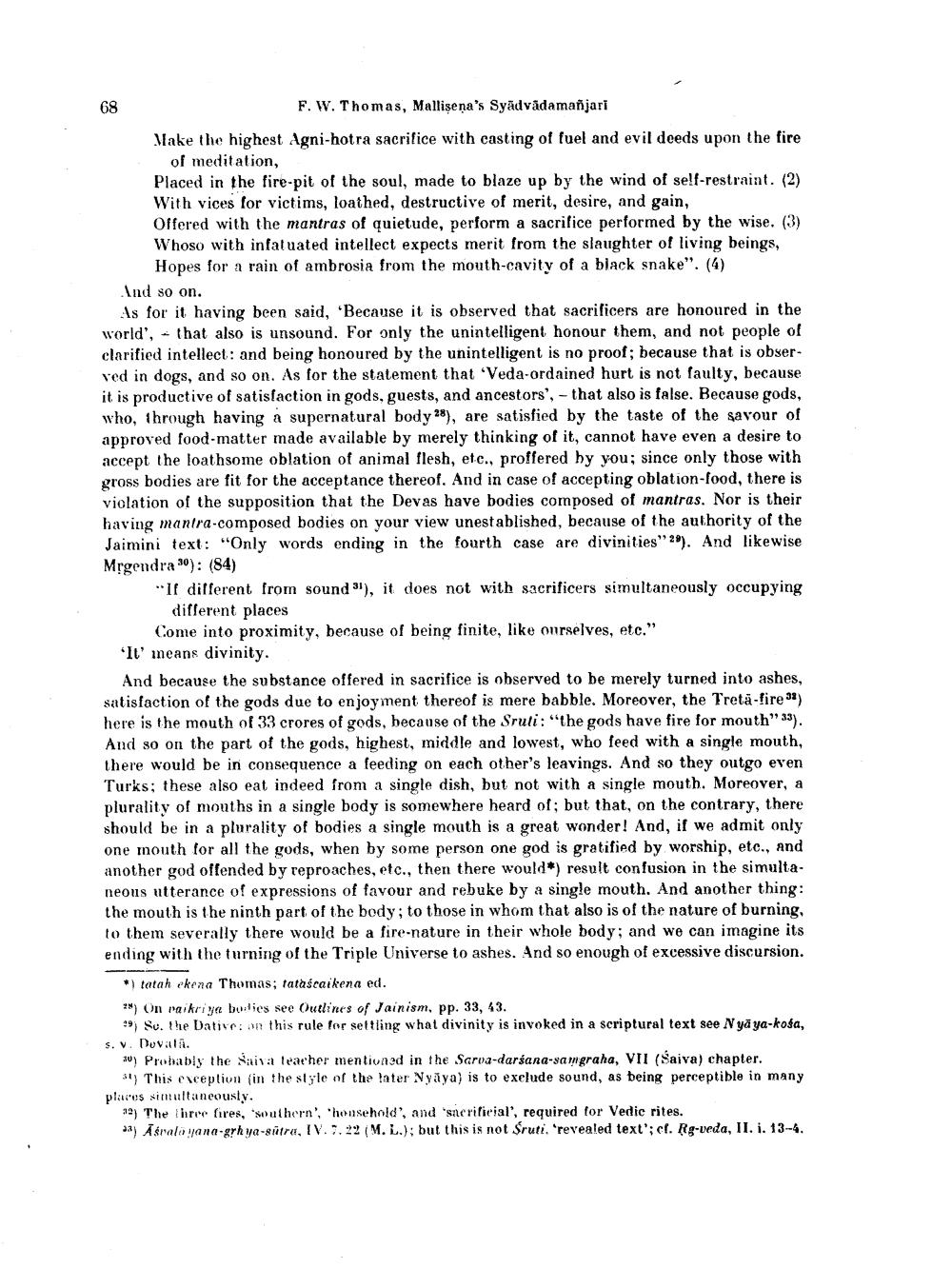________________
F. W. Thomas, Mallisena's Syadvadamañjari
Make the highest Agni-hotra sacrifice with casting of fuel and evil deeds upon the fire
of meditation, Placed in the fire-pit of the soul, made to blaze up by the wind of self-restraint. (2) With vices for victims, loathed, destructive of merit, desire, and gain, Offered with the mantras of quietude, perform a sacrifice performed by the wise. (3) Whoso with infatuated intellect expects merit from the slaughter of living beings,
Hopes for a rain of ambrosia from the mouth-cavity of a black snake". (4) And so on.
As for it having been said, 'Because it is observed that sacrificers are honoured in the world', - that also is unsound. For only the unintelligent honour them, and not people of clarified intellect: and being honoured by the unintelligent is no proof; because that is observed in dogs, and so on. As for the statement that 'Veda-ordained hurt is not faulty, because it is productive of satisfaction in gods, guests, and ancestors', - that also is false. Because gods. who, through having a supernatural body 28), are satisfied by the taste of the savour of approved food-matter made available by merely thinking of it, cannot have even a desire to accept the loathsome oblation of animal flesh, etc., proffered by you; since only those with gross bodies are fit for the acceptance thereof. And in case of accepting oblation-food, there is violation of the supposition that the Devas have bodies composed of mantras. Nor is their having mantra-composed bodies on your view unestablished, because of the authority of the Jaimini text: "Only words ending in the fourth case are divinities"2"). And likewise Mrgendra ?): (84)
Il different from sound), it does not with sacrificers simultaneously occupying
different places
Come into proximity, because of being finite, like ourselves, etc." 'It' means divinity.
And because the substance offered in sacrifice is observed to be merely turned into ashes, satisfaction of the gods due to enjoyment thereof is mere babble. Moreover, the Treta-fire 38) here is the mouth of 33 crores of gods, because of the Sruti : "the gods have fire for mouth" 33). And so on the part of the gods, highest, middle and lowest, who feed with a single mouth, there would be in consequence a feeding on each other's leavings. And so they outgo even Turks; these also eat indeed from a single dish, but not with a single mouth. Moreover, a plurality of mouths in a single body is somewhere heard of; but that, on the contrary, there should be in a plurality of bodies a single mouth is a great wonder! And, if we admit only one mouth for all the gods, when by some person one god is gratified by worship, etc., and another god offended by reproaches, etc., then there would*) result confusion in the simulta. neous utterance of expressions of favour and rebuke by a single mouth. And another thing: the mouth is the ninth part of the body; to those in whom that also is of the nature of burning, to them severally there would be a fire-nature in their whole body, and we can imagine its ending with the turning of the Triple Universe to ashes. And so enough of excessive discursion.
*) tatah ekena Thomas; tatascaikena ed. 7) On raikri ya boties see Outlines of Jainism, pp. 33, 43.
- So. the Dative on this rule for settling what divinity is invoked in a scriptural text see N yä ya-kosa, s. v. Duvitta.
30) Probably the Naiva leacher mentioned in the Sarva-darsana-samgraha, VII (Saiva) chapter.
5) This exception in the style of the later Nyaya) is to exclude sound, as being perceptible in many places simultaneously.
3) The three fires, southern', 'household', and 'sacrificial', required for Vedic rites. >) Asralo yana-grh ya-sutra, IV.7.22 (M. L.); but this is not Śruti, 'revealed text'; cf. Rg-veda, II. i. 13-4.




